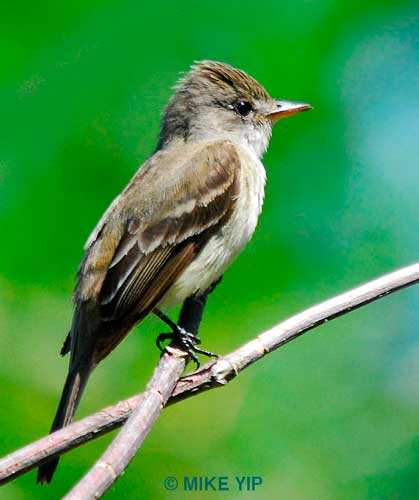A Willow Flycatcher has been singing his love song from the swamp south of the CUH building lately. I wonder if he’s the same flycatcher who sang every summer morning from the top of the dead willow snag on the north end of Main Pond. He may very well be – birds often do come back to their same breeding grounds. One male Willow Flycatcher returned to its Oregon territory every year for eleven years.
Willow Flycatchers belong to the Empidonax family. There are eleven different species of Empidonax that come to the US from Central and South America to breed every summer. The distinguishing characteristic of Empidonax flycatchers is that there is no distinguishing characteristic. They all look alike: brownish to olive backs, grayish to yellowish fronts, a couple of whitish wingbars, whiskers around the beak. Not a peacocky family. In fact, they’re all what we birders call LBBs – little brown birds (or, if you’re from Texas, LBJs – little brown jobs).
Oh, you can see minor differences in eye-rings, yellow wash on the belly, bill length, tail length, and such. But the truth is, the only way to tell one fly-catcher from another is to hear its song.
That’s what I loved so much about my favorite Willow Flycatcher of last year: his song. He would fly up to the topmost branch of the tree and wait while the House Finches amassed there to sing their own liquid, complex melodies. The finch songs would go on and on while the Willow waited in the wings, so to speak. Finally, the finches would pause, and the flycatcher would swell himself up like Pavarotti . His little neck would bulge, his beak would point itself up to the heavens, and forth would pour the little singer’s aria: “FITZ-bew! FITZ-bew! FITZ-bew!”
I have to say the Willow’s song is one of the least melodious in all the bird kingdom. Many people would scarcely classify it as song at all. More the crankcase than the trumpet. But to the singer, his music was sublime.
It’s a lesson for all us seemingly untalented talents. To an outside ear, our song may not qualify us to appear on stage, but it is uniquely ours. No one else can sing it as we do. No one else ever has or ever will. Therefore, sing it loud and sing it proud. It is beautiful.

